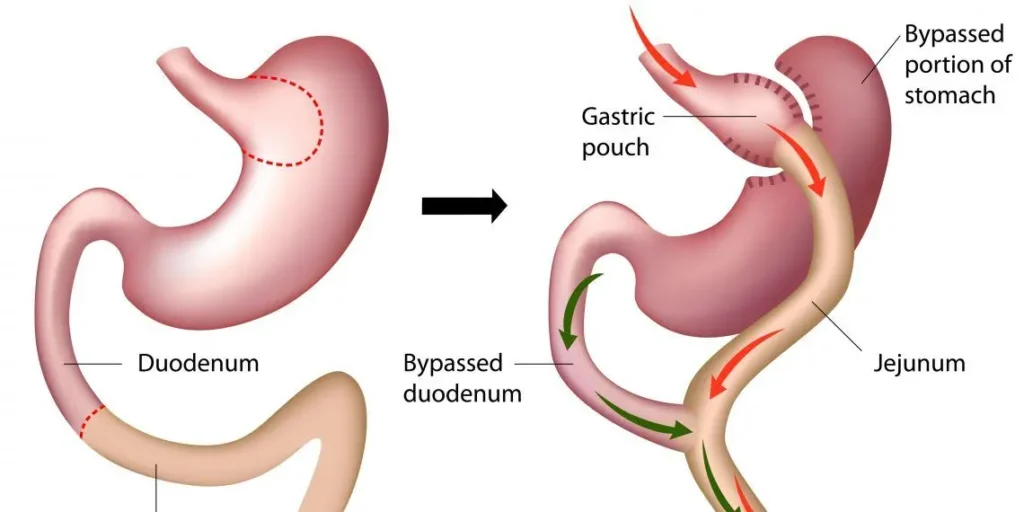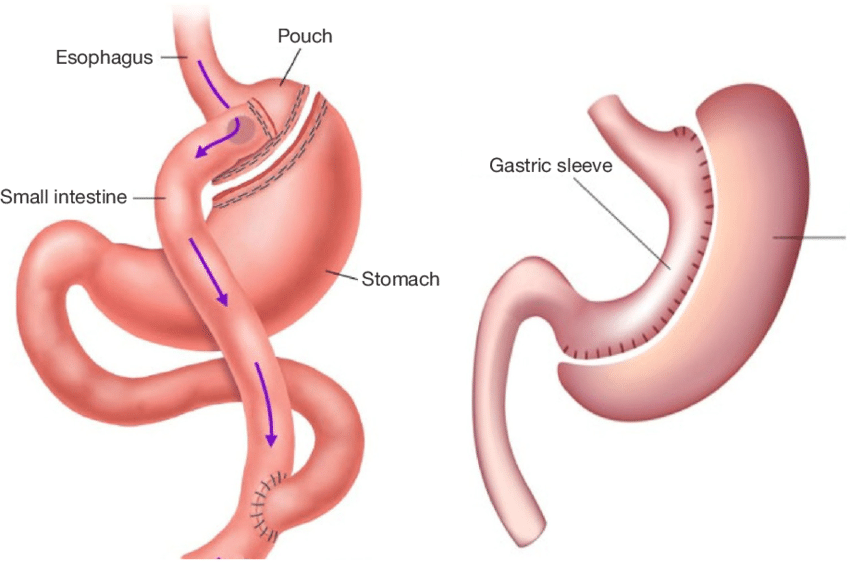Click now to find out what you wonder about Gastric Bypass.

what is a gastric bypass
Gastric bypass surgery, which is a common method in obesity surgery, is a restrictive and combined method that causes malabsorption. Gastric Bypass surgery is technically created by reducing the stomach to a small pouch and connecting the small intestine to the shrunken stomach from a certain segment and connecting it upwards.
The rest of the stomach is not removed like sleeve gastrectomy surgery. However, there is no food entry into the remaining stomach. Gastric juices and enzymes continue to be produced from the remaining part of the stomach for the digestion and absorption of nutrients. Thus, patients with Gastric Bypass both eat less food and take fewer calories due to the reduction of the stomach, and because there is a direct transition from the remaining small stomach to the small intestine, a decrease in the absorption of high-calorie foods is created and thus weight loss is achieved. Therefore, weight loss is achieved in obesity problems with two different mechanisms. After gastric bypass surgeries performed with the laparoscopic method, there is no deep incision in the skin and pain as a result. The surgery is performed under general anesthesia and takes an average of 1 hour. Before the operation, extensive pre-op tests are performed and interviews are held with chest diseases, anesthesia, psychiatry and endocrinology units. Leak test is performed on the patients on the 2nd post-op day and the patient is fed orally. Patients are discharged on the 3rd day after the operation.

How Long Does Gastric Bypass Surgery Take?
The duration of gastric bypass surgery is approximately one and a half hours. Before this surgery, the patient can be treated for a long time. After the necessary tests and examinations are completed, the patient is taken to surgery. Small incisions are made during the surgery. Some doctors need stitches, while others do not. After the surgery, the patient can be kept in the hospital to see if there is a leak, as in sleeve gastrectomy surgery. Afterwards, the patient is fed with liquid or pureed food for a while.
Weight Loss with Gastric Bypass Surgery in Turkey
Like the sleeve gastrectomy surgery performed in our clinic in Bursa, the first two months after gastric bypass, weight is lost very quickly. The patient will continue to lose weight for a long time. Loss of appetite will also continue. However, a situation such as weight gain can be experienced, albeit a little. Patients with an excessive carbohydrate and unhealthy diet can gain weight again. Thanks to gastric bypass surgery, patients struggling with obesity can lose 50 or 60 kilos in two years.
WHAT ARE THE ADVANTAGES OF GASTRIC BYPASS SURGERY?
Gastric Bypass surgery is an excellent tool to provide individuals with long-term weight control in small portions without the old strong sense of appetite. For most patients, long-term weight loss and weight maintenance is successful. Depending on weight loss, it creates a permanent solution for type 2 diabetes and concomitant diseases caused by excess weight. After the surgery, patients experience physical and psychological satisfaction.
WHAT ARE THE RISKS AND COMPLICATIONS OF GASTRIC BYPASS SURGERY?
Like any surgical procedure, gastric bypass surgery has potential risks and complications. These are rare and everything possible is done to prevent them from happening. The most common complications are leakage, bleeding and embolism. These risks can be seen especially in the first 15 days after surgery. Contacting your doctor immediately when symptoms of complications are seen shortens the treatment process of complications and positively affects the success of the treatment. Leaks in the staple line are the most risky complication of this surgery. Symptoms of leakage include high fever, severe abdominal pain, high pulse, chills and fatigue. Your doctor’s timely and successful interventions play an important role in the treatment of possible leaks. Detection and treatment of leakage is very easy for an experienced bariatric surgeon. It just takes longer. Another risk is the risk of embolism. There is a risk of embolism in every surgery; however , the risk of embolism is higher in obesity surgeries due to being overweight . In order to prevent the risk of embolism, a blood thinner injection is started the day before or on the day of the operation and embolism socks (varicose compression stockings) are put on the patients. After the operation, the patient should use the anti-embolism stockings and blood thinners for ten days at home after discharge. The most common complication is bleeding. Observation of bleeding is very easy with drain follow-up. In patients with bleeding; fatigue, dizziness and low blood pressure. Treatment of bleeding is quickly overcome by blood supplementation only, depending on the amount of bleeding. Apart from these, vitamin-mineral deficiencies may occur due to malnutrition and decreased absorption. Patients should have their blood tests done regularly after the surgery and regularly use the drugs and supplements prescribed by the doctor for vitamin and mineral deficiencies. Dumping syndrome, also called rapid gastric emptying, occurs when food, especially sugar, passes too quickly from the stomach to the small intestine. Dumping syndrome occurs 10 to 30 minutes after eating and causes symptoms such as abdominal pain, cramping and diarrhea in individuals. Helps prevent post-operative nutritional changes syndrome. Dumping syndrome can be prevented by eating smaller meals and limiting sugary foods.
Are there any harms of gastric bypass surgery?
Gastric bypass surgery is an extremely harmless operation. If you are severely obese and have trouble losing weight, your healthcare provider may recommend gastric bypass surgery. All surgical procedures carry risks. So, if gastric bypass is not harmful, what are the possible side effects? Some bariatric surgery risks include:
Acid reflux,
Risks associated with anesthesia,
Chronic nausea and vomiting
Esophageal enlargement,
Inability to eat certain foods
Infection,
Stomach congestion,
Weight gain or inability to lose weight
HOW SHOULD NUTRITION BE AFTER GASTRIC BYPASS SURGERY?
On the 2nd day after gastric bypass surgery, patients are tested for leakage and then we start a 15-day liquid diet period. Following the 15-day liquid diet period, 15 days of puree and then solid nutrition are started. Diet periods are carefully explained by your dietitian. The role of the dietitian in the postoperative period is extremely important for every patient. Compliance of patients with these diet periods is the most important factor in preventing complications.
Patients need to master the habit of eating with small bites, chewing very well and slowly. Another rule in nutrition is to distinguish between solid and liquid. There should be a minimum of 30 minutes between foods and drinks. Thus, nutrient deficiencies are prevented and gastric expansion is prevented.
After the surgery, it is important to comply with a well-adjusted carbohydrate, protein and fat ratio and fiber-rich nutrition programs. Approximately 60-80 g of daily protein is recommended for nutritional adequacy and postoperative wound healing. Food sources to meet this amount of protein may vary according to the tolerance of the person. Over time, tolerance increases and consumption of protein-containing food sources expands. In addition, deficiencies of minerals such as iron, calcium and B vitamins are frequently seen after this surgery and may cause iron deficiency anemia and osteoporosis. In addition to a nutritious diet, supplementation with B complex and multivitamins may be necessary to prevent potential deficiencies. In order to prevent symptoms such as cramps and diarrhea caused by dumping syndrome, and to prevent weight gain, patients should give up old habits such as consuming sugary and high-calorie foods frequently and acquire new healthy eating habits for themselves.
What Should Those Who Have Gastric Bypass Pay Attention To?
Definitely work with a specialist dietitian. As your physician, I can say that you should pay attention to the following guidelines;
A balanced diet is essential for vitamin and mineral deficiency.
Consumption rate of solid foods should be reduced.
Low-carbohydrate-high protein-oriented nutrition programs should be organized.
All kinds of foods and beverages with oil, sugar and gas should be avoided.
Caffeine and salt consumption should be minimized.
Main meals should be 3 snacks and 3 regular meals.
In between meals, only fruits should be focused.
Food should be chewed abundantly.
Water consumption should be 2.5 liters or more. These rates are not suitable immediately after the operation.
It can gradually progress to 1 liter in the first week, 1.5 liters the next week, and 2.5 liters in the following periods.
Weight Loss Process After Gastric Bypass
Obese patients with a body mass index of 40 and above are ideal for gastric bypass surgeries. However, if your body mass index is below 40 but above 35, it is necessary to have one of the diseases such as obesity-induced sleep apnea, blood pressure problem, diabetes in order to have gastric bypass surgery. The most suitable candidates for gastric bypass surgery are patients who need to lose at least 40 pounds or more. The amount of weight that can be lost is directly proportional to your stability in the diet programs you will apply. With both your regular habits in diets and your exercise programs, you can lose weight faster, more and more healthily.
In the first year after gastric bypass surgery, you will be able to easily lose about 70% of your excess weight. When we look at the general average of all obesity patients after the operation, we can state that 85% of the patients are successful in reaching the ideal weight. This rate also includes keeping the weights under control. In other words, after reaching the ideal weight, it means that the ideal weight is also maintained. In the first few months after the operation, faster and more weight is lost. The general average is a minimum of 6 and a maximum of 10 kilograms. In the following months, you will be able to continue to lose more balanced and less weight consistently.
How Many Hours Does Gastric Bypass Surgery Take?
Surgical interventions for the stomach can be completed for a certain period of time, just like other surgical methods. However, the times can be shortened by many factors. We can only talk about general averages here. Gastric bypass surgeries, on the other hand, are usually completed in 90 minutes, but sometimes it can take up to 120 minutes. Gastric bypass surgeries take at least half an hour longer than sleeve gastrectomy surgeries. The patient is under general anesthesia and does not feel any pain during the operation. After the operation, he does not feel pain in the first hours until the effects of the anesthesia wear off.
What is the Difference Between Gastric Bypass and Gastric Sleeve?
In sleeve gastrectomy surgeries, approximately 80% of the stomach is cut and removed. In gastric bypass surgeries, most of the stomach is disabled, a small stomach is created and the large stomach is left uncut. For this reason, sleeve gastrectomy operation is irreversible. However, gastric bypass surgeries are potentially reversible. While sleeve gastrectomy operations are usually completed in an hour, the average duration of gastric bypass surgery is one and a half hours. In gastric sleeve surgery, only a large part of the stomach is cut and removed. In gastric bypass surgery, a shorter route is made to the stomach – small intestine line after most of the stomach is deactivated. Thus, the nutrients taken from the stomach to the intestines reach the intestines in a shorter time and the calorie absorption levels in the food are reduced. In both surgeries, patients have a feeling of fullness in a shorter time.
How are gastric bypass prices determined?
Costs may vary depending on your location. When considering how to pay for the surgery, the price of laparoscopic gastric bypass surgery should not affect your decision to choose a qualified surgeon. Of the three most popular bariatric surgeries (lap Band, sleeve gastrectomy, gastric bypass), gastric bypass is the most expensive. Duodenal switch surgery and some revision procedures are often the most expensive of all bariatric procedures.




